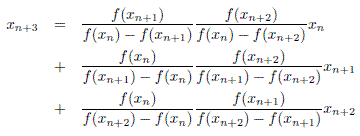| Re: Lyuka and the Ostrowski method's for Root Seeking Message #2 Posted by Lyuka on 20 Aug 2011, 11:03 a.m., in response to message #1 by Namir Hi,
The Ostrowski's method is a kind of root finding algorithm that uses reverse-interpolation to approximate the root.
can be used instead of Ostrowski's
This can be tested replacing a line in _ost.c Quote:t = (h * a - b) / (h - 1.0); by Quote:t = a * e * f * (f - e) - b * d * f * (f - d) + c * d * e * (e - d); t /= (f - e) * (f - d) * (e - d); Though the convergence of the method shown above is almost quadratic (order of about 1.8) for a zero of multiplicity 1 in a neighborhood of the zero, it's NOT recommended as it tends to diverge when the guess is not near the zero.
IMHO, the most important thing as a root finding algorithm is not
the order of convergence, but the stability of convergence, i.e. ability to find a root with very few chance of divergence.
Regards, |

